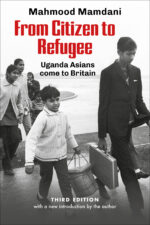The value of this brilliant, thoroughly researched, and vigorously written book extends far beyond Makerere University and the case study of its academic union that is a central feature. The authors raise questions applicable to universities worldwide: the meaning of “democracy” for members of the academy, the relationship of the university to government, and the responsibility of academics and the media to the society that they ostensibly serve. Makerere’s failure to advance gender equity is the main focus of one chapter and a leitmotif in several others. A probing and sometimes personal analysis of the Law School, with which all the authors are associated, complements its contribution to the cause of democracy in Uganda. At once reflective and challenging, the authors invite further exploration by academics and policy-makers around the world.
— Carol Sicherman author of Becoming an African University: Makerere, 1922-2000 (2005), Professor Emerita, Lehman College, City University of New York
Penned by brilliant legal academics, this anthology about that African academic giant—Makerere University—takes the reader on a fascinat- ing and engaging journey about the history of the organizational expression of African intellectuals and their links to the democratic struggles in Uganda. Arguably the best text on academia I have read in a long time, the book provides a deeply examined and superbly chronicled account of the manner in which Makerere University has been a thorn in the side of successive dictatorial governments, while also unpacking the warts that threaten to blight the academy; simply magnificent!
— Dr. Willy Mutunga, Chief Justice & President of Supreme Court, Republic of Kenya, 2011-2016
This is a very valuable and a timely contribution to our understanding of sites of struggle in African countries. It focuses on Makerere University as a site of struggle for democratisation. The authors have done a marvellous job. If the sister universities of Dar es Salaam and Nairobi were to produce studies, we would have a veritable trilogy of struggles at our universities in East Africa.
— Issa G Shivji, Professor Emeritus of Public Law & First Julius Nyerere Professor of Pan-African Studies, University of Dar es Salaam, Tanzania
Alma mater to presidents, public intellectuals and pundits of all disciplines, Makerere University has attracted considerable scholarly and popular attention, both in respect of its prominence and achievements, as well as with regard to its failures and foibles. As the oldest (and arguably best-known) university in Uganda and the wider eastern and central Africa region, Makerere looms large in the history of higher education on the continent.
This book explores the relationship between a public university of unique historical importance and the contestations over democratization that have taken place both within campus and beyond. It is pivoted around the late-20th century struggles by university staff and students for improved living conditions against the backdrop of the early programs of structural adjustment and economic reform pursued by the National Resistance Army/Movement (NRA/M) government adopted soon after taking power in 1986.
Although seemingly introverted in focus, in many respects these efforts represented the earliest forms of political resistance against a regime of governance that promised a great deal, but disappointingly delivered considerably less. Collectively, the chapters demonstrate that there is neither a single narrative nor a textbook formula about the relationship between the academy and democratic struggles. Instead of forcing an unsupported and false consensus on the definitive role of Academia in politics, the book seeks to stimulate a robust debate on the subject.
CONTENTS
Preface by Hon. Justice Solomy Balungi Bossa
1. Introduction: The Academy and Political Struggle in Uganda J. Oloka-Onyango
2. The Role of Academia in the Democratization Process Benson Tusasirwe
3. For whom doth the Academic bell really toll? Unpacking the engagement of Makerere University Academic Staff Association (MUASA) in Uganda’s Democratization struggles Maria Nassali
4. Intellectuals and the Fourth Estate: Analyzing the Coverage of Makerere University Academic Staff Association (MUASA) in the Ugandan Media (1989-2020) Ivan Okuda
5. Between Activism and “Hooliganism”: Civic Engagement and Democratic Struggles in Makerere University Students Guild Dan Ngabirano
6. Juggling the Personal and the Political: The Case of Female Academics at Makerere University Sylvia Tamale
7. Contending with the past and building for the future? The Paradoxical contribution of Makerere University School of Law to dictatorship and democratization in Uganda Busingye Kabumba
8. Conclusion: The Political Economy of University Education: Revisiting democratic alternatives for Makerere and Uganda Frederick W. Jjuuko
Contributing Authors


